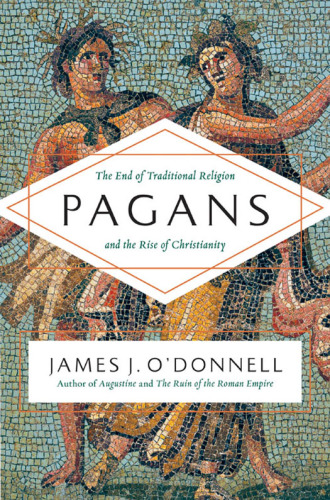
Pagans
The End of Traditional Religion and the Rise of Christianity
کتاب های مرتبط
- اطلاعات
- نقد و بررسی
- دیدگاه کاربران
نقد و بررسی

January 19, 2015
The early Christian movement began amid numerous other religions in the Hellenistic world, but the now-familiar story of the rise of Christianity very often leaves out the complex relationships between early Christians and these other religions. O’Donnell (Augustine) shines a light on that omission, in meticulous detail and through lively storytelling, animating the world of ancient religions, early Christianity’s place in that milieu, and the ways that the first Christians created a category of paganism to describe other religions. In the first and second centuries, Christians were the odd ones out: “if there are many gods, people who claim to believe in exactly one god, a god few had heard of... are, functionally speaking, atheists,” he writes. O’Donnell brilliantly chronicles the growing toleration of Christianity by the Roman Empire up through the fourth century, when it became the accepted religion of the empire. He convincingly demonstrates what many have known all along: paganism is a category that modern Christians invented to define themselves against other religions and to use, often, to justify persecution of those different from Christians. This is a must-read book.

February 1, 2015
O'Donnell (Georgetown Univ.; The Ruin of the Roman Empire) offers a view of the rise of Christianity from a unique perspective--that of the pagans whose traditional religions faded in popularity as monotheism took root. O'Donnell contends that "all [traditional] religion was local" and without a recorded history, since religion was so embedded in daily life. He notes that certain pagan practices, such as blood sacrifice, lost popularity and had all but vanished long before they were officially banned by Christian officials. While Emperor Constantine I converted to Christianity and gave imperial patronage to his chosen religion, allowing Christianity to expand significantly its numbers and reach, the concept of "Christianity" in opposition to "paganism" wasn't created until the fourth and fifth centuries CE, when Christian writings overdramatized the vanquishing of outdated, disparate paganism. During those centuries, Christianity provided a radically new idea of a religion that also constituted a single community of worshippers, cemented by the recorded texts that gave it history and consistency. VERDICT Though the rise of Christianity did not follow a simple path, the author presents this somewhat circuitous route through an engaging narrative. While clearly geared toward a general audience, O'Donnell's work is grounded in solid scholarly research. This book will appeal to the armchair historian and those with an interest in the Roman Empire, early Christianity, traditional religions, and religious history.--Crystal Goldman, Univ. of California, San Diego Lib.
Copyright 2015 Library Journal, LLC Used with permission.

December 1, 2014
In ancient Rome and much of Western Asia and Europe at that time, the existence of many gods was taken for granted. Shrines stood on street corners, and public ceremonies commonly invoked one deity or another. Political or military victory could result in the building of a grand temple in honor of the god who intervened in human affairs and ensured the successful outcome. Even intellectuals were believers. People were accepting of and respectful toward gods they didn't even know. But then something changed. A Jewish sect called the Christians made the audacious assertion that their god was the only god. Traditional religion became paganism, and Christianity eventually triumphed, though it took a century or two to get on message. O'Donnell's book is a work of history that tells an important story from the perspective of those for whom the label pagan would have no meaning. And although it is serious scholarship, it does not take itself too seriously. The result is an engaging view of antiquity few of us have seen.(Reprinted with permission of Booklist, copyright 2014, American Library Association.)

























دیدگاه کاربران